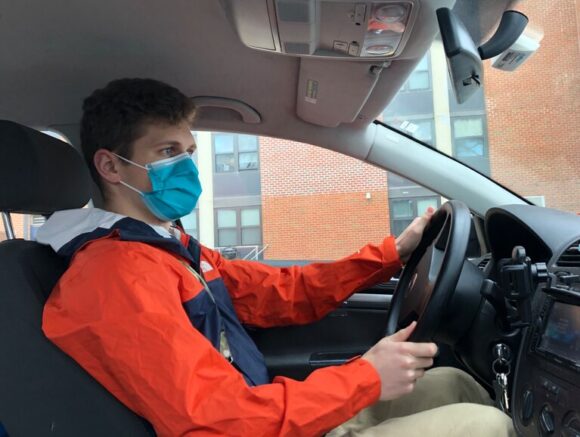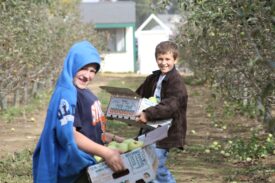
4-H alumnus Nate Byrnes, 21, makes a Meals on Wheels delivery last week in Mercer County, N.J. Photoe: courtesy of Dan Balco.
College kids — like Mercer County 4-H alumnus Nate Byrnes — are filling the gap
By Karen Weese
Each Monday morning at 10:30, Ann and Bill Walker start their routine: They climb into their Ford SUV, pick up insulated bags of hot meals and deliver them to a half-dozen elderly homebound people around their New Jersey community.
It’s been this way for eight years for the Walkers — he’s 85 and she’s 83 — dedicated volunteers for Meals on Wheels in Mercer County. Now on Mondays, their SUV stays in the driveway as they are homebound themselves, taking coronavirus precautions like most Americans.
Millions of elderly Americans depend on Meals on Wheels for their nourishment, and three-quarters of the volunteers who deliver the meals are over 55 years old.
They’re staying home, and college students are helping to fill the gap.
In the past month, about 60 of Mercer County’s 180 delivery volunteers have stepped back, and about 45 volunteers have taken their place, including about 20 college students.
Now on Mondays, Nate Byrnes, 21, a biology major at the College of New Jersey, loads an insulated bag of hot meals and a wheeled cooler of chilled food into the back of his 16-year-old Volkswagen and delivers meals.
“I was trying to figure out something, anything, that I could do to help,” said Byrnes, who grew increasingly concerned as the coronavirus exploded across the state.
As an aspiring doctor and a not-quite-certified emergency medical technician, he was frustrated thinking about all of the ways he could be helping if only he were further along in his medical education, or if only he had taken his EMT test a little sooner.
“All of the ambulance squads are totally overwhelmed,” he said. “ERs are totally overwhelmed.”
The coronavirus upended his plans, too — tests were postponed and parades and events were canceled as campus shuttered for the rest of the semester.

Nate Byrnes (far right) at the 2016 Mercer County 4-H Fair – recognized for his contributions to the fair, including his efforts to educate the public about 4-H and agriculture.
When his mother showed him an appeal for help from the local Meals on Wheels on Facebook, he couldn’t call fast enough. He attended an orientation the following day; he was out delivering meals two days later. He has delivered meals almost every weekday since.
Meals on Wheels welcomed him with open arms, and the rate of new elderly residents requesting meal delivery has tripled in the past month or so.
“I feel like it’s a really good way to be able to do something to help, especially when it seems like right now there aren’t that many ways we can help,” he said.
Sasa Olessi Montaño, chief executive of Meals on Wheels of Mercer County, which serves 300 mostly elderly, homebound people, said delivering meals is “keeping seniors alive.”
Meals on Wheels of America serves 2.4 million seniors nationwide. Although delivering daily, hot, nutritious meals to people who cannot leave their homes has always been a lifesaving mission, keeping seniors nourished and healthy at home — and out of nursing homes — now is more vital than ever.
“We’re so grateful to have students jumping in,” she said.
Many of the older volunteers have expressed dismay about having to halt their volunteer work — “they email me in anguish,” said Olessi Montaño — but they are relieved and pleased to hear that younger people are stepping up. “It really takes the edge off of it for them,” she said.
“I didn’t want to stop at all, but we knew we needed to,” said Ann Walker.
“It was a hard decision,” added Bill Walker. “When you see someone every week for years, you become friends, and you know that sometimes you are the only person they will see all day.”
According to Meals on Wheels of America, 59 percent of recipients live alone. On a given day, the delivery volunteer is often the only other person they see.
Kathleen Trainor, 86, of Ewing Township said the meals she has delivered from Meals on Wheels “are a lifesaver.”
Trainor lives alone and uses a wheelchair to get around. Because she can no longer cook, the meals are her primary source of nutrition. Every day, a volunteer knocks on her door to deliver a hot tray (usually meat or fish and two vegetables) and a bag of chilled items, including a salad, a piece of fresh fruit, a dinner roll and a drink.
Trainor said she looks forward to the human interaction — the volunteers are “just so pleasant” — and they often stop to chat or pet her dog, Duchess. Financially, it’s invaluable, too.
A small number of Meals on Wheels recipients make a voluntary donation toward the cost of their meals, but Trainor, like the majority of Meals on Wheels recipients, gets them free. The program is funded through a combination of private donations and federal grants, and it is open to anyone homebound.
To recruit college students and other younger drivers, Olessi Montaño put out the call on social media and asked existing volunteers to recruit their children or grandchildren.
“Some students are coming with their parents, or a friend, or a significant other, but we’ve definitely seen an uptick in younger volunteers,” she said.
It’s not the first time the chapter has partnered with colleges or college students. Olessi Montaño has brought in nursing students as “friendly visitors” for seniors — and meal prep for Meals on Wheels is based in the kitchen of nearby Rider University. Still, it’s the first time the chapter has targeted students to fill the crucial “boots-on-the-ground” role of delivery volunteer, she said.
In recent weeks, the protocol for delivering meals has changed. Meals are still delivered daily, but there’s no more chatting at the door with recipients. The meal is left in a bag at the door, and the volunteer steps back six feet to wait until the recipient retrieves it. Delivery volunteers use hand sanitizer often and wear gloves or masks when possible.
Meals are still cooked from scratch, but kitchen staff wear face masks and gloves. Everyone’s temperatures are taken each day, and volunteers wait outside by their cars as the food is brought out.
Back at the Walkers’ house, Bill has been filling his time working on a genealogy project, and Ann has been reading more. There’s a jigsaw puzzle on the dining room table, and they go for a walk every afternoon.
But the Walkers are itching to get their Mondays back to the way they used to be, motoring around town delivering meals with a side of friendly conversation.
“We had to stop for now, but we’ll be back,” said Bill Walker. “We’re just taking a sabbatical.”
Captions from WP
College student Nate Byrnes, 21, makes a Meals on Wheels delivery last week in Mercer County, N.J. (Courtesy of Dan Balco)
After delivering for Meals on Wheels for years, Ann Walker, 83, and Bill Walker, 85, of Lawrence Township, N.J., stopped volunteering because of their heightened coronavirus risk. (Courtesy of Thomas E. Walker)
Kathleen Trainor, 86, in Ewing Township, N.J., uses a wheelchair and can no longer cook. She relies on Meals on Wheels for her primary meal every day. (Courtesy of Colin Lenton)
Editor’s Note: this article originally appeared in The Washington Post.


